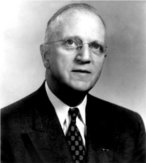Distinguished Faculty AwardRALPH BULLARD

RALPH BULLARD
Professor of Chemistry
1919-1961
Friday, September 21, 2001
A true friend to his colleagues and students, a loyal member of the faculty, and a patriotic citizen were the phrases chosen by Zeta Chapter of Phi Beta Kappa in remembrance of Dr. Ralph Bullard, professor of chemistry at Hobart and William Smith Colleges from 1919 until his death in November of 1961.
Born in Worcester, Massachusetts, on December 6, 1895, the son of Charles Merrick and Mary Henrietta Blake Bullard, he received his B.A. from Clark University in 1917, and in 1925, Bullard became a full professor at the Colleges, after having joined the faculty as an instructor in chemistry in 1919 with promotion to the rank of assistant professor in 1921.
He and the former Adele Lillian Lipphard were married August 27, 1925. They had one daughter, Barbara Jean. Bullard and his wife took up residence at 101 St. Clair Street near the campus of the Colleges and were quite active in the life of the Colleges and Geneva community. Possessing a deep Christian faith, he was a member of the vestry of Geneva’s Trinity Episcopal Church. He was a Fellow of the American Association for the Advancement of Science and was also a member of the American Chemical Society, Phi Beta Kappa, Sigma Xi science honorary, and Kappa Sigma fraternity.
Ralph Bullard also had a keen sense of social responsibility, which certainly contributed to his incessant pursuit of protection against mustard gas, a feared chemical agent of warfare that had plagued the doughboys of World War I.
Research designed to discover an anti-mustard compound began in the laboratories of the Colleges under the direction of Dr. Bullard in the 1930s. Under his direction, researchers carried out tireless investigation in a number of disciplines. During the course of this research, almost every type of poison gas known to chemical warfare was prepared and studied, and students in gas mask became common sights in the special poison gas section of the chemistry laboratory.
From this research, a compound was discovered in 1939 that neutralized the poisonous miasma of mustard gas, which caused severe burns and blisters. The first patent application for this protective compound was made in 1940, though it was not accepted until 1962 as a result of the concerns of the U.S. Military.
During World War II, Dr. Bullard was a technical aide with the rank of full commander, at the Navy Research Laboratory at Anacostia, Washington, D.C. He was awarded the Legion of Merit Award in 1946 and was promoted to the permanent rank of captain, USNR, in 1951, and retired in that rank in 1958.
While his research and discovery proved invaluable to our country at war, his teaching proved as invaluable to many students at the Colleges.
In its remembrance of Dr. Bullard in 1962, the Zeta Chapter of Phi Beta Kappa, noted, “We have heard many times that ‘those who can, do, and that those who cannot do, teach.’ This was certainly not true for our late brother, Ralph Bullard... He cajoled and drove students to do the best of which they were capable in academic pursuits. But he maintained that high academic accomplishments are an empty husk without the practice of integrity and high morality.”
Dr. Walter H. Durfee, Hobart College Dean emeritus and President of the Colleges, remarked in 1957, “Throughout his career here has been one of our most outstanding teachers, particularly with the students majoring in chemistry. He drives them very hard, and somehow manages to make them like it... Those who do their major work under him count themselves lucky, and they seem still to count themselves lucky when they have been out of college for many years.”
Those students have kept alive the legacy of Dr. Ralph Bullard with their accomplishments in chemistry, medicine, and life. And for this, many offered thanks and remembrances upon this occasion.
“I vividly recall meeting Dr. Bullard for the first time in 1953 as he stood before his organic chemistry class in the old Merritt Hall. He was an imposing figure, nonetheless was a gentleman, who delivered a volley of equations and chemical reaction bell to bell... Occasionally he broke the pattern with a joke, which immediately brought down the house. Silence was restored in short order! I’ve always remembered the valuable lessons I learned from Dr. Bullard. He taught me not only chemistry, but about life...” says Phillip R. Belluscio ’56.
Dr. Charles Lobeck ’48 describes Bullard as “one of my mentors... I am forever in his debt. He was an unforgettable character and is very real in my memory. His language was colorful and he had a very radical view of politics. But his eccentricity was accompanied by a real concern for students, interest in teaching, and a kind of brusque warmth.” He credits Bullard, noting “he led me into medicine.”
For Dr. Richard P Singer ‘60, Bullard was particularly impactful “Not having achieved the very high GPA most often associated with entry into medical school, I nevertheless approached two science teachers for their recommendations but their responses were less than encouraging. I then, with much trepidation, approached Dr. Bullard, who said, ‘my recommendation or anyone else’s wouldn’t mean much if you had a great GPA, would it?” He told me that I was capable of applying myself much more and would accomplish my goals if I did and, relating to me as a person and not just a GPA, willingly wrote me a letter of recommendation. As I now approach retirement, I think of a handful of people who significantly affected my life in tangible, positive ways, allowing me to eventually help many others through my own professional career. The good Dr. Bullard is among them and to him, I am eternally thankful.”
